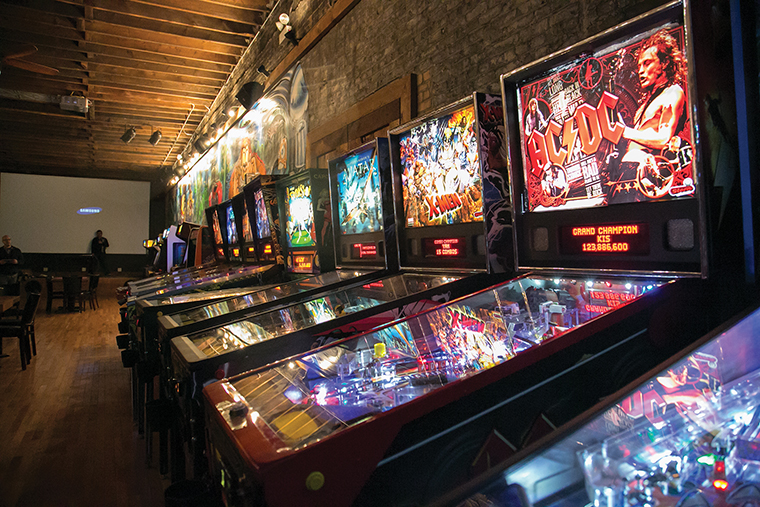Pac-man and pints: alcohol becomes lifeblood of modern arcades
Emporium Arcade Bar, 1366 N. Milwaukee Ave., is an alcohol-serving arcade that opened June 19, 2012 after Chicago-native Danny Marks spent time in New York City managing Barcade, an arcade that offered alcohol in addition to pinball machines and vintage arcade games.
March 31, 2014
Once thought to be an extinct form of entertainment, arcades are coming back to Chicago in the form of “barcades.”
Now adults with disposable income, the kids who once spent their hard-earned quarters at the arcades of old, have grown up and are venturing to Chicago’s handful of arcade bars—including Emporium Arcade Bar, 1366 N. Milwaukee Ave.; Headquarters Beercade, 2833 N. Sheffield Ave.; and Logan Arcade, 2410 W. Fullerton Ave., which opened Feb. 10—at a point in their lives when losing a few bucks is not going to break the bank.
The barcade trend has been growing in popularity across the U.S. during the last decade. Typical barcades have pinball machines and arcade games, and sell locally crafted beers from microbreweries in the area—meshing the childhood nostalgia of gaming with America’s favorite pastime: drinking.
The arcade industry became a national craze in the early 1980s. Arcades are intrinsically linked to that era of pop culture, setting the backdrops for movies such as “WarGames” and “Back to the Future Part II.” The industry grossed $3 billion in 1980 and $7 billion in 1981, according to a June 16 The Verge report. In 1983, after Time-Warner acquired Atari, the game maker behind “Space Invaders,” video games brought in 70 percent of Warner’s revenue, according to the report.
After working as a manager for Barcade’s Brooklyn, N.Y., location—one of the first arcade bars to emerge in the early 2000s—Chicago native Danny Marks opened Emporium Arcade Bar on June 19, 2012. The venue features 65 pinball machines and vintage arcade games such as Galaga and Pac-Man.
“I think you start to see trends where people, when they hit their 30s, start to bring back a lot of the things they were into when they were younger,” Marks said.
Gaming writer and journalist Tristan Donovan, author of “Replay: The History of Videogames,” said the draw of arcades is a new experience for millennials.
“[Until the ‘90s, arcades] basically had the best technology—you couldn’t get the visuals [or] the sound effects [at home] that you could get in an arcade game,” Donovan said. “We’re [also] talking about a time before the Internet was big, a time before mobile phones. Arcades were a social place to go.”
Donovan said the initial decline of the arcades was largely a result of the games falling behind on graphic and thematic trends.
By 1987, the Nintendo Entertainment System introduced a new wave of gaming with games such as “The Legend of Zelda,” and “Final Fantasy,” which for the first time allowed players to save their progress. Gaming became less about the novelty of achieving the highest score and more about experiencing extended adventures.
“The technology of the home consoles and PCs caught up,” Donovan said. “Suddenly the arcade games didn’t look that much better, and the gameplay was still that kind of ‘We’ll give you a 20-second thrill for your 50 cents.’”
Because gamers did not have to leave the comfort of their couches to play the best games, arcades lost their status as a social hub, Donovan said.
Despite these changes, Marks said the success of barcades has less to do with nostalgia and more to do with a successful business model. Entrepreneurs are simply following suit, he said.
It’s not just video games that are in resurgence. Stern Pinball Director of Marketing Jody Dankberg said the pinball industry is growing alongside barcades.
“We’ve seen a renaissance taking place within our industry, pinball in particular,” Dankberg said. “[And] we’re not just seeing that in Chicago…. We’re also seeing that worldwide.”
Based in Melrose Park, Ill., Stern is the oldest and largest manufacturer of pinball machines worldwide. Before video games, pinball was king, Dankberg said. He added that it occupies a vital space in arcades and said the new trend has quadrupled Stern’s revenue since 2009.
From the late 1990s to the early 2000s, pinball machines—previously found in restaurants across the city—experienced the same downturn, but the new trend is turning things around, according to Dankberg
“Four or five years ago, there was no place to play pinball in Chicago,” Dankberg said. “Now there’s five or six places in the city and another handful of places right outside the city to play.”
Dankberg said he thinks barcades are appealing because they carry games that are easy to learn but hard to master, attracting both skilled players and novices.
“This could be the last goodbye to the arcade and there will be a great fad for a few years and then people will leave and it will finally fade away for good,” Donovan said. “But equally, it doesn’t need to get back to the big boom of the ‘80s.”








